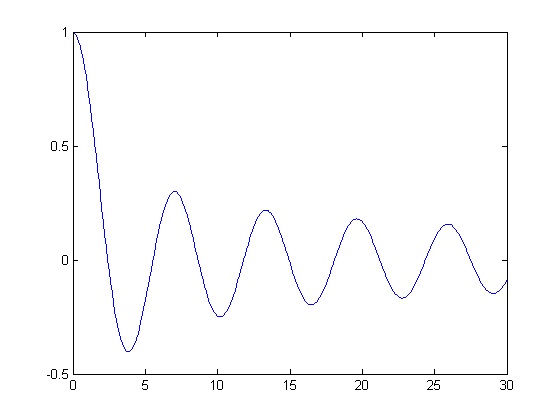SecantDemo.m
Contents
Overview
Illustrates the secant method coded in secant.m to solve  near the two initial guesses
near the two initial guesses  and
and  .
.
Find a root of the Bessel function 
We use the built-in MATLAB function besselj to solve

Note that the secant method requires two initial guesses. Here we use

Note how secant.m needs functions as input arguments.
disp('Find a root of the Bessel function J0:') J0 = @(x) besselj(0,x); disp('Initial guesses are x0 = 0.1, x1 = 0.5') [x,iter] = secant(J0,[0.1 0.5]); disp(sprintf('A root of J0 is x = %f.\nIt was computed in %d iterations.\n',x,iter)) x = [0:.1:30]; plot(x, besselj(0,x))
Find a root of the Bessel function J0: Initial guesses are x0 = 0.1, x1 = 0.5 x2 = 6.85908459790363 x3 = 9.79493381399967 x4 = 8.50658069581209 x5 = 8.69675460128128 x6 = 8.65398507702502 x7 = 8.65372719408842 x8 = 8.65372791292170 x9 = 8.65372791291101 x10 = 8.65372791291101 A root of J0 is x = 8.653728. It was computed in 10 iterations.

Find the first positive root of the Bessel function 
Notice how the previous example did not produce the first positive root. In order to get that, we need to change our initial guess. We now use

The rest is the same as above (and therefore not even repeated in the code).
%pause disp('Find the first positive root of the Bessel function J0:') disp('Initial guesses are x0 = 1, x1 = 4') [x,iter] = secant(J0,[1 4]); disp(sprintf('The first positive root of J0 is x = %f.\nIt was computed in %d iterations.\n',x,iter))
Find the first positive root of the Bessel function J0: Initial guesses are x0 = 1, x1 = 4 x2 = 2.97496279446610 x3 = 1.20601365422573 x4 = 2.49126712130979 x5 = 2.41179960026729 x6 = 2.40469143790313 x7 = 2.40482575314659 x8 = 2.40482555770122 x9 = 2.40482555769577 x10 = 2.40482555769577 The first positive root of J0 is x = 2.404826. It was computed in 10 iterations.
Compute 
We solve the equation

where we use the two initial guesses

%pause disp('Compute sqrt(2):') sqr2 = @(x) x^2-2; disp('Initial guesses are x0 = 1, x1 = 2') [x,iter] = secant(sqr2,[1 2]); disp(sprintf('sqrt(2) = %f was computed in %d iterations.\n',x,iter))
Compute sqrt(2): Initial guesses are x0 = 1, x1 = 2 x2 = 1.33333333333333 x3 = 1.40000000000000 x4 = 1.41463414634146 x5 = 1.41421143847487 x6 = 1.41421356205732 x7 = 1.41421356237310 x8 = 1.41421356237310 sqrt(2) = 1.414214 was computed in 8 iterations.